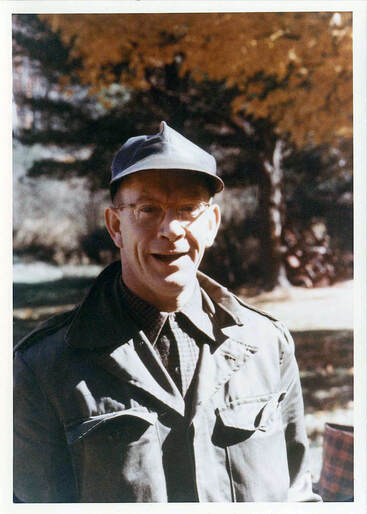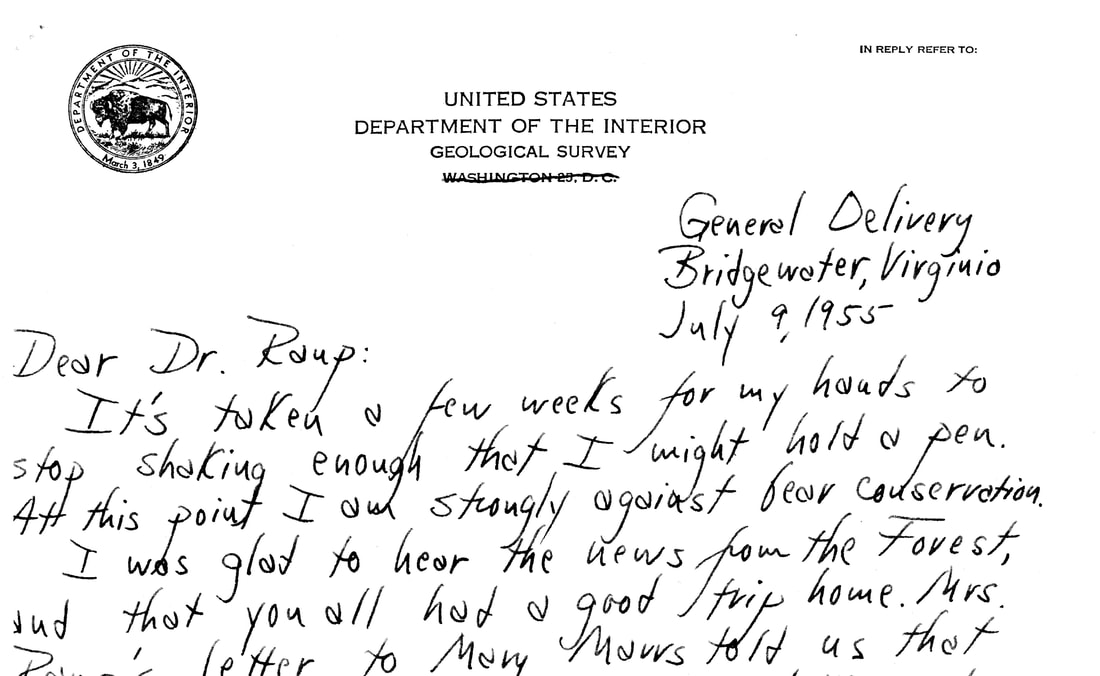 Pud Goodlett in 1957. From the Harvard Forest archives. His wry humor was legendary among his friends and colleagues. Pud Goodlett in 1957. From the Harvard Forest archives. His wry humor was legendary among his friends and colleagues. Tim Cooper, of Oakdale, Minn., reminds us of the human truths we can uncover from personal letters. If you would like to submit a blog post for Clearing the Fog, contact us here. A couple of years into my pursuit of an undergraduate degree at the University of Minnesota, I was threatened with summary expulsion. No, it wasn’t my grades; I had finagled my way into the honors program and maintained high marks. And no, it wasn’t my youthful predilection to juvenile delinquency—I was too busy studying to sustain that lifestyle. Rather, as the registrar’s office curtly informed me, I had failed to declare a major prior to the onset of my junior year. Two days before the deadline, I met with a professor who would become a mentor and friend until the end of his life. Professor Paul L. Murphy—constitutional historian; social-justice advocate; Pulitzer Prize finalist; and gentleman—took an early interest in me. Professor Murphy and his wife would often invite me to dinner at their home where I was accepted as a “sibling” to his two daughters. What he saw in me, I don’t know. But his guidance in any number of issues always gave me clarity. What did he say? “Timothy,” he intoned, “what academic major other than history will allow you to read, analyze, and discuss other people’s letters and diaries?” It wasn’t advice, it was an observation. And I was sold. The next afternoon, 30 minutes before being asked to pack my bags, I entered “history” as my major. I haven’t looked back. Nor did I think much about this incident until the passing of my grandmother some years later. When my father and I cleaned out her home after her death, we found stacks of notebooks comprising my grandmother’s diary, which she had maintained from the age of 8. Her entries were initially written in Gaelic, the tongue of her native Ireland, and then suddenly transformed into proper English after she settled in the U.S. as a young immigrant. Finally, barely 10 days before cancer’s ultimate victory, she just as suddenly returned to her native language. Indeed, this recapitulation to Gaelic happened mid-sentence. Her final entries were all in Gaelic. When I read those diaries, I recalled Professor Murphy’s observation. Recently, I again remembered my mentor’s words when Sallie Showalter forwarded to me a file of her father’s correspondence from the Harvard Forest’s archival collections. I cannot describe the excitement I had scanning through Pud’s letters. Let me try to explain. In them we see the arc of his relationships with family and friends, as well as his professional interactions and scientific observations. But more importantly we see the development of a “voice,” of an academic rueful and wry one minute, proper and scholarly the next. I read them and felt as if this absent and unknown man, a man I have known of since I was 15 years old but never met, was speaking to me. And I like him, enormously. I understand his world-vision, his striving, and his occasional self-doubt. But it is his humor—and his horrible handwriting—that sing to me. Letters and diaries do that to you. So let me end in a plea. In the next few days, I ask you to recover paper and pencil or pen, envelope, and stamp. Think of a loved one, a family member, a friend, or an acquaintance. Write that person a heart-felt letter in your own hand and post it by “snail-mail.” The subject doesn’t matter. It can be humorous or serious, gossipy or informative, apologetic or explanatory. An unexpected letter may mean more to the recipient than you can anticipate. And you never know what historian will relish your words in some unimagined future. Ed.--On June 23, 1955, Pud and his colleague John T. Hack were chased off a mountain near Bridgewater, Va., while doing work for the U.S. Geological Survey. They encountered eight other bears while conducting their research, but only one—a mother with two cubs—"attacked." The incident was enshrined in a local newspaper, in family lore, and--as in the following examples--in Pud's own self-deprecating humor. In the following excerpt from a letter dated June 20, 1956, Pud tries to reassure Dr. Hugh Raup, the director of Harvard Forest who was out of the country for the summer, that all is well at the Forest during his absence.
2 Comments
Barbara Fallis
8/2/2019 10:05:00 pm
I am responding to Uncle Pud's last note in your post. He wrote that things get more dangerous with age but had no idea that the age of our current environmental and political situation had/s more to do with politics than numbers of years lived. When he mentioned the one acre forest fire I almost laughed...not scoffing but that many of our states could so quickly extinguish such a fire instead of 1000's of acres. Perhaps we will soon replace the N-EPA (non environmental protection agency) with sensible, economical solutions. I shudder at what he would think about all of this but then again, maybe he would be on his feet in front of Congress trying to save us. I prefer to think that would have been a real possibility. Thank you for your post Tim.
Reply
Sallie Showalter
8/2/2019 10:41:20 pm
I vacillate between wishing I could discuss all that's going on in today's world with both of my parents and feeling relieved that they don't have to witness it. But thanks to you, Barbara, I'm now going to imagine my father in front of Congress railing about what's happening at the EPA, at the Department of the Interior, at the Department of Agriculture, at the CDC, and at all the formerly science-based governmental institutions. That would be one fiery speech!
Reply
Your comment will be posted after it is approved.
Leave a Reply. |
Details
Archives
June 2023
Categories
All
|




 RSS Feed
RSS Feed